[Dec 2007, Volume 4 Quarterly Issue] Pdf File size - The IIPM Think ...
[Dec 2007, Volume 4 Quarterly Issue] Pdf File size - The IIPM Think ...
[Dec 2007, Volume 4 Quarterly Issue] Pdf File size - The IIPM Think ...
You also want an ePaper? Increase the reach of your titles
YUMPU automatically turns print PDFs into web optimized ePapers that Google loves.
REIMAGINING INDIA<br />
mean a slow down in pushing the economic<br />
agenda. A lesser reliance on market<br />
forces of the type that emerges as<br />
with a market economy and coupled with<br />
an intensifying bureaucratization of<br />
processes can bring in a slow down making<br />
the transition that much more difficult<br />
to execute. Bhagwati points out to<br />
the overhang of the State leading to ‘the<br />
inability to trust the market when scarcities<br />
are acute and the tasks are challenging’.<br />
21 <strong>The</strong> impact of this overhang on<br />
the market had certain long term effects<br />
for the practices of the State in the economic<br />
sphere. A ‘combination of industrial<br />
licensing and controls at home with<br />
import and exchange controls externally,<br />
effectively cut off rigours of competition<br />
from all sources and made the creation<br />
of a rentier, as against an entrepreneurial,<br />
economy more likely.’ 22 An overhang<br />
of this type has an adverse impact on the<br />
creation of the market and on agents, or<br />
entrepreneurs, who constitute an important<br />
part of the market. <strong>The</strong> movement<br />
from early post-colonial period and into<br />
latter day envisages the highs and the<br />
lows of the State and its influence on the<br />
economy and the polity. This has not<br />
been a period of the routine; it has instead<br />
been a period that can be characterized<br />
by the term ‘change’.<strong>The</strong> economy<br />
progressed from early reaching of<br />
high notches as at the end of the early<br />
plans, to a leveling of the growth and<br />
whereby the economy was described as<br />
one that was inflicted by a Hindu rate of<br />
growth. <strong>The</strong> economy periodically recorded<br />
weaknesses in its ability to deliver<br />
as much as was demanded of it. In<br />
a manner of speaking the overstretched<br />
State which depended on large scale<br />
controls to be able to deliver the promises<br />
that were made now faced road<br />
blocks in its way forward. <strong>The</strong> liberaliza-<br />
<strong>The</strong> process of debate is augmentative. <strong>The</strong> need is to<br />
engage the State by the civil society. Debates are expected<br />
to enhance an understanding of the way that the intricate<br />
relationships between the triad of actors and also to help<br />
determine the way forward from the current relationship<br />
tion of the 1990s and thereafter, accordingly,<br />
focused on dismantling the economic<br />
controls that had been instituted<br />
during the course of the journey after<br />
independence. <strong>The</strong> growth rates that<br />
have been realized, and the prospects<br />
that have come to be expected, has<br />
prompted a re-look yet again at what<br />
could be the best solution for moving<br />
forward. <strong>The</strong> market has expectedly become<br />
an arena to be looked into with<br />
more than usual interest.<br />
Debates Are Contributive<br />
We started with the observation that the<br />
debate on the market has progressed<br />
beyond the confines of the few. It now<br />
includes the many instead, and this for<br />
the simple reason that the market concerns<br />
all. Markets, then, turn out to be<br />
constructs that are influenced by the<br />
manner in which economic activities are<br />
handled in society. Markets have that<br />
quality which encourages the many to<br />
arrive at answers about its construct.<br />
This happens because of the relationship<br />
that individuals have with the market.<br />
This is important because it also<br />
brings in the role of democracy and following<br />
the adoption of which there is an<br />
influence by members of society who opt<br />
for a political governance of the type<br />
that is shaped by this political mode of<br />
participation. It is about the influence<br />
that civil society has on the political terrain<br />
and also about the influence that<br />
civil society can have on that terrain.<br />
<strong>The</strong> influence that matters in the context<br />
that has been drawn out here is that on<br />
the State and Market relationship and it<br />
is here that the influence could be one<br />
of moving forward such that the outcome<br />
is that of consensual gain. <strong>The</strong><br />
political influence that leads to the<br />
putting up of a confrontationist barrier<br />
is of negative consequence. It is here<br />
that the process of debate is augmentative.<br />
<strong>The</strong> need is to engage the State by<br />
the civil society. <strong>The</strong> debates are expected<br />
to enhance an understanding of the<br />
way that the intricate relationships between<br />
the triad of actors, namely, the<br />
State, the market and the civil society<br />
works and also to help determine the<br />
way forward from the current status of<br />
existing relationship. A preponderant<br />
30 THE <strong>IIPM</strong> THINK TANK


![[Dec 2007, Volume 4 Quarterly Issue] Pdf File size - The IIPM Think ...](https://img.yumpu.com/29766298/29/500x640/dec-2007-volume-4-quarterly-issue-pdf-file-size-the-iipm-think-.jpg)
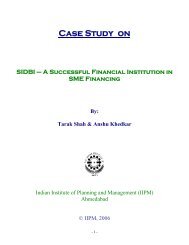
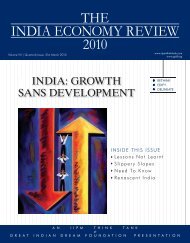
![[Feb 2008, Volume V Annual Issue] Pdf File size - The IIPM Think Tank](https://img.yumpu.com/43961117/1/190x245/feb-2008-volume-v-annual-issue-pdf-file-size-the-iipm-think-tank.jpg?quality=85)
![[June 2008, Volume V Quarterly Issue] Pdf File size - The IIPM Think ...](https://img.yumpu.com/41693247/1/190x245/june-2008-volume-v-quarterly-issue-pdf-file-size-the-iipm-think-.jpg?quality=85)
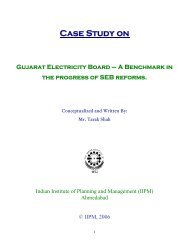
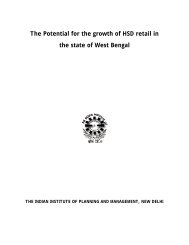
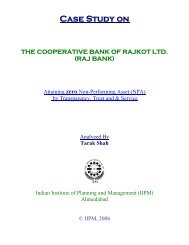

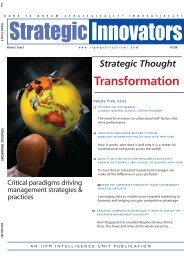
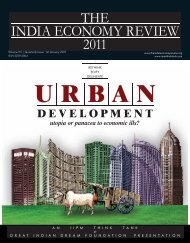
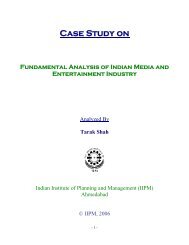
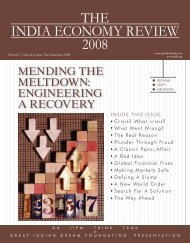
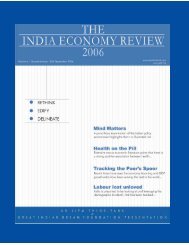
![[Volume VI | Quarterly Issue: 31st May 2009] Pdf File size](https://img.yumpu.com/27796051/1/190x245/volume-vi-quarterly-issue-31st-may-2009-pdf-file-size.jpg?quality=85)